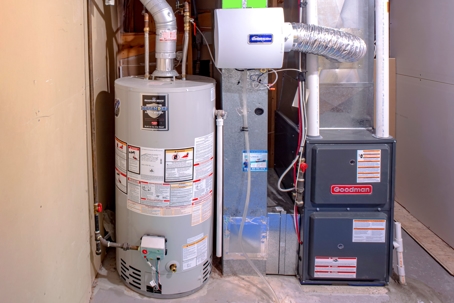Energy bills—we all want to save as much money as possible on them. The question is, how do you do it? You could go around your house unplugging various electrical devices or by turning the lights off every chance you get. However, the best way to reduce energy costs is to change your energy-using habits, and to do that, you’ll need to know the top energy users in your home. Keep reading to find out the appliances that are raising your utility bills the most, and how you may be able to use them differently to lower your power costs, courtesy of our expert electricians at Lightning Bug Electric.
HVAC Systems
Undoubtedly, the top energy-using appliances for the average homeowner are heating and cooling systems. The typical HVAC set-up will account for a staggering 47% of your energy bill—so now you know why every HVAC company makes such a big deal about energy efficiency! More energy-efficient furnaces, AC units, and other heating and cooling devices may consume less than 47% of your household’s energy, while less energy-efficient units may consume more.
The key thing for you to look for when picking out a new HVAC system is the Annual Fuel Utilization Efficiency, or AFUE rating. The higher this rating is, the more energy-efficient your system will be. Also, during the summer, you should let your air conditioner run all day, while during the winter, you should always turn your heating system off when you are not using it. Keeping your AC unit on during a hot day, even when you leave for work, will ensure your system does not have to overexert itself when you come back home. Letting your heater run for too long, on the other hand, doesn’t do anything other than jack up your energy costs up, possibly putting your home in danger. One final suggestion—turn your thermostat up during the colder months and down during the hotter months. This may sound counterintuitive, but it can help to balance out the costs of your heating and cooling systems. Installing a smart thermostat, which will automatically adjust to the ideal temperature settings for you, may help with this as well.
Water Heaters
Water heaters account for about 14% of your overall power costs—a real drop from the 47% consumption rate of your HVAC system. However, 14% isn’t nothing, and much like HVAC equipment, water heaters are an important part of your daily life, so there’s no way to just stop using them entirely. Fortunately, you may be able to cut down on water heater expenses through straightforward adjustments like taking shorter showers—or even skipping the occasional shower during the wintertime, when your unit will have to work harder to provide the heat you expect. It’s also a good idea to call a technician occasionally to inspect your system and flush out the tank (assuming you do not have a tankless water heater,) thereby reducing sediment build-up and improving efficiency. You also do not want to install a water heater that is too large or small for your property, as either one of these mistakes can significantly raise your energy bills. In general, families of five or less can usually get away with a water tank that holds 50-60 gallons of water. If your household has five or more people in it, you may need a tank that holds 80 gallons or more. Conversely, if you live alone or with one other person, a 20-30 gallon tank may be right for you.
Washers & Dryers
Washer and dryer combos typically use just a hair less energy than water heaters, accounting for roughly 13% of your energy costs overall. If you’ve ever lived in an apartment and had to gather quarters every week to do laundry, you know firsthand what a luxury it is to have an in-unit washer and dryer. That said, just because you own this equipment does not mean you have to use it all the time. While you shouldn’t have to wear smelly, old clothes, you also don’t need to do a load of laundry every time a shirt gets dirty. If you find that you are frequently doing small loads of laundry or running your washer and dryer for single items, consider trying to wait for your laundry to accumulate and doing larger loads instead. It may take some more planning in terms of laying out your wardrobe, but cutting down on the amount of laundry you do can also help decrease your energy costs.
Lights
Lighting devices account for roughly 12% of the average person’s energy costs. To reduce your lighting expenses a bit, you can always just turn on your lights less. However, there’s one other thing you can do that may help reduce your bills while preventing you from shrouding yourself in darkness all the time. If you are not currently using energy-efficient LED lightbulbs in your home, you should really consider making the switch today. LED lights use about 80% less energy than halogen bulbs. You can also find them virtually anywhere and they are compatible with all modern light fixtures. In short, there’s no reason not to switch to LED lights if you have not already upgraded your home with these industry-standard lightbulbs.
To learn more about how you can save money on your energy bills, click here to contact Lightning Bug Electric online, and to schedule service, call our skilled electricians at (404) 471-3847.

